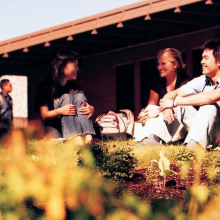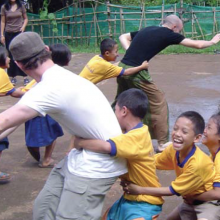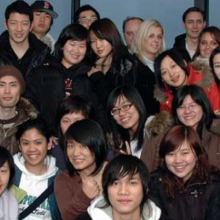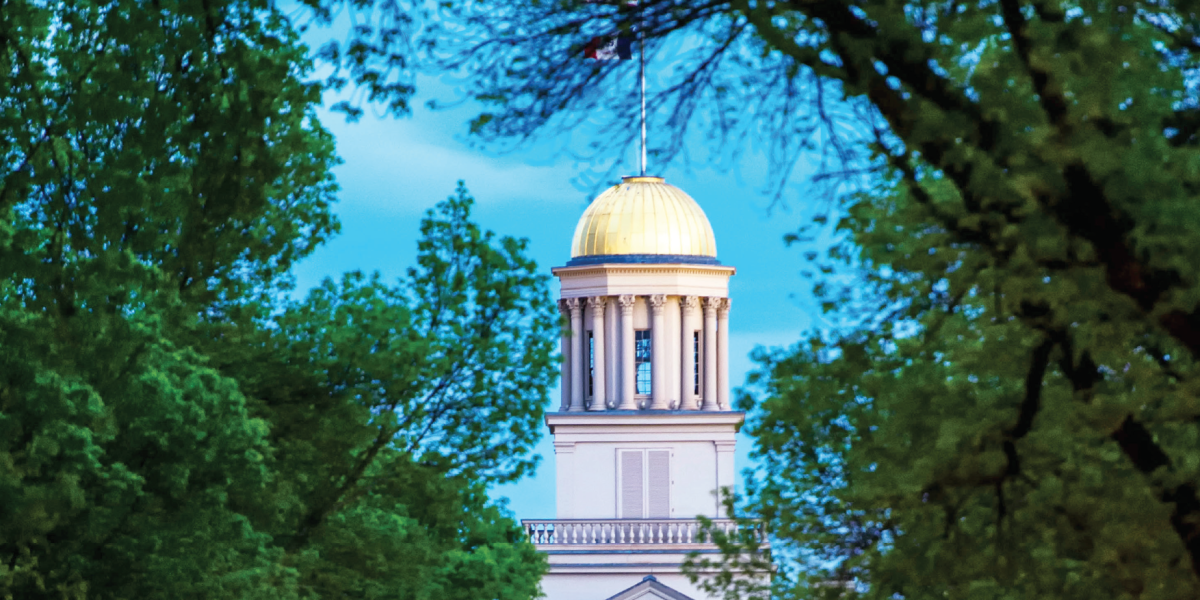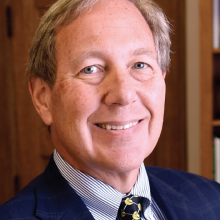Inclusion and Equity
Best Practices for Integrating the ADA in the ISSS Office
Designing for Inclusion: Advice for Education Abroad Program Leaders
Intercultural Communication in Practice
2007 Spotlight Shoreline Community College
When Shoreline Community College was built in a Seattle suburb 10 miles from the Space Needle in 1964, the wooded, 83-acre campus was designed to look like a Japanese botanical garden. The student union, the PUB, was an acronym for Pagoda Union Building, and until the 1990s its sports teams competed as the Shoreline Samurai. That nickname was abandoned after student leaders decided it was demeaning, and today Shoreline athletes take the field as the Dolphins.
But Shoreline itself is more international than ever, with a record 643 international students enrolled in 2006-07 and scores of students along with faculty studying overseas each summer. Many of these ambitious programs were spawned by an initiative the college took in 2001 when it created an International Programs Advisory Committee (IPAC) with an annual purse of $20,000 to disburse grants to faculty to develop short-term study and service abroad projects. That next summer, faculty led dozens of students on three-week study trips to Antigua, Guatemala; Monterrey, Mexico; and London, England. Every summer since then, 45 to 70 Shoreline students have headed off to earn credit in China, Japan, Ireland, Greece, Turkey, Namibia, South Africa, Thailand, Honduras, Peru, Argentina, Iceland, and elsewhere.
Through Shoreline’s membership in the Washington Community College Consortium for Study Abroad, students also can take classes during the fall, winter, and spring in London, Florence, Paris, Salamanca, and San Jose, Costa Rica. From 1999 through 2006, 120 Shoreline students studied abroad through the consortium, and three Shoreline professors taught classes overseas.
In a region replete with excellent community colleges, Shoreline must scramble for students, despite its excellent track record in sending graduates to the University of Washington for four-year degrees. The commuter college, two miles inland from Puget Sound, is the tenth largest of Washington’s 34 community colleges. In addition to awarding associate degrees in arts and sciences, it prepares students for careers in health, technology, and computers and has an award-winning automotive training center. Most of the international students who make their way to Shoreline seek to transfer to universities, says Thalia Saplad, executive director of the Office of International Programs. “For international students, business is number 1. Our engineering, health occupation, and nursing programs are also draws, as well as biotechnology.” Many international students come from Asia, with the largest numbers from Indonesia, Hong Kong, Korea, and Japan.
After two presidents departed in four years, Shoreline found stability when civil rights attorney Lee D. Lambert was promoted in 2005 to interim president and later given the job on a permanent basis. Through it all, support from the top for Shoreline’s internationalization was unwavering. The commuter campus earmarked $85,000 in 2005–06 and another $85,000 in 2006–07 toward internationalization projects, including grants for faculty development, study abroad scholarships as well as improved services for international students. “The administration is very supportive of building programs and curricula that prepare our students to be global citizens,” says Saplad.
Praise from Accreditors
The Northwest Association of Schools and Colleges and Universities commended Shoreline in 2002 for “its excellent international studies program.” The visitors left “impressed by the exemplary and creative efforts to recruit and accommodate international students and to use resources from the success of that program to encourage faculty and students to travel and study abroad.”
A 10-person staff works on international programs and advises the growing ranks of students from around the world. “We’ve made a concerted effort in the past several years to integrate our international education programs and our international students with the rest of the campus,” says Saplad. “More and more international students have taken leadership positions in our student government. They hold eight of the 12 executive offices this year.”
International Peer Mentors
Mari Kosin, assistant director of international student services, laid the groundwork for the emergence of international students into leadership positions with a program she started five years ago called International Peer Mentors (IPM). Five students are selected annually for these paid positions, in which mentors help newcomers to the United States adjust to life at Shoreline and in the Seattle area. The mentors take diversity training alongside full-time college staff and help shape both educational and extracurricular activities for their peers.
“They play a major role in our orientation for international students,” says Saplad. “They’ve helped get more international students to partake in activities and to get more involved in their education. They undergo professional development with my staff and we send them to conferences around the state. It’s the first time in years where international students have really seen themselves as part of the institution.”
Colleen Ferguson, assistant director of international education, said the first international students to run for campus-wide office were veterans of the International Peer Mentors program. “They learned a lot about the institution and how it worked. They had the confidence to apply for posts in student government because they had held these IPM leadership jobs for a year,” she says.
An Exploration of Irish Literature and Culture
The International Programs Advisory Committee, which includes two Shoreline students, two staff members, and a broad representation of faculty, sifts through faculty proposals for summer study abroad courses and decides which ones to fund. Gary A. Parks, a professor of English literature and creative writing, received a green light from IPAC to take creative writing students to Ireland in August 2006 to explore the sources of inspiration for W.B. Yeats, James Joyce, and other authors and to craft stories of their own. In addition to viewing the Book of Kells in Trinity College in Dublin and standing before the majestic Cliffs of Moher jutting into the Atlantic off County Clare, they attended a poetry slam at a pub in Galway and worked up sketches about life in nineteenth century, famine-stricken Ireland while visiting Inishmore, birthplace of novelist and activist Liam O’Flaherty.
“The driving query of the class was that I wanted people to explore the question of why such a small nation has produced so much great literature,” says Parks, who has taught at Shoreline for 16 years. Six men and two women, all 21 or younger, signed up for the course, which cost $2,400 plus $600 for meals. Given a choice of taking an introduction to Irish literature or a short story writing class, all opted for the latter, “which simplified things for me and made it a bit more fun,” he says.
He had students read excerpts from Mackin’s 1955 novel, Rain on the Wind. “We did the Yeats pilgrimage to Sligo, and visited Inishmore, an island in the Gaeltacht off the west coast of Ireland,” he says. “A lot of native speakers there still speak Irish. Liam Flaherty’s stories get mystical in places, and when you read them on Inishmore you can really understand how this place would give rise to these stories.”
“It was a great experience,” says Parks. When the students came home, half signed up for an Irish literature course that he inaugurated at Shoreline that fall. “That class filled up with 27 students. It was a nice follow-up in terms of internationalizing the campus,” he says.
Service Learning in Jamaica
One of the most frequent fliers on Shoreline’s faculty is psychology professor Robert B. Thompson, who regularly leads students on a 16-day summer service learning trip to the Blue Mountains of Jamaica, where they volunteer in the schools of a rustic village. Thompson worked as a psychologist alongside the Peace Corps in that same village two decades ago and has returned with students ever since, first while teaching at Rollins College and over the past 13 years at Shoreline.
“It’s a village without electricity only 25 miles from downtown Kingston, but very difficult to get to. We have to go up the mountain by four-wheel-drive truck,” he says. “The students live at the houses of two coffee farmers and work within the community, primarily tutoring in two elementary schools.” Thompson twice has spent six-month sabbaticals in the Blue Mountains and returned to campus in 2006 determined to help the Jamaican farmers secure a niche and better prices in Seattle’s food markets for their rich coffee beans.
“I recruit the students out of my psychology classes,” says Thompson. “They are very diverse. On this summer’s trip, 75 percent have never before traveled outside the Northwest. It’s a unique opportunity for them. I have three students over age 50, several in their 30s and 40s, and students who are 18, 19 years of age.”
Both Thompson and the students find the readjustment upon return to Seattle challenging. “You’re bombarded with the technologies, the lights, noises. Everybody’s in a hurry. Once you get accustomed to a certain rhythm, it’s very difficult to come back and be thrown into another culture,” he says. “The students see their culture and their surroundings in a different way.” Some, he adds, change career paths so they can deal directly with the poverty they saw in the Blue Mountains.
A Commitment to Multicultural and Global Awareness
Thompson, who served on the IPAC for four years, says Shoreline “definitely is an unusual community college. A lot of four-year schools don’t support the type of unique (study abroad and international service) programs we have.”
Parks said the emphasis on the international at Shoreline fits in with its “tradition of being a strong academic transfer school. It’s just part of our history and culture here. We have a commitment to multicultural awareness and global awareness.”
Shoreline’s summer study abroad programs are open to all students and members of the community, although traditionally they have drawn primarily those on track to transfer to a four-year institution. The Office of International Programs now is stepping up efforts to interest more of the students who are seeking technical and professional degrees in study abroad. Two new exchange partnerships have already borne fruit. Last winter, six Danish business students from Erhvervs Akademi Vest (Business Academy West) in Esbjerg, Denmark, came to Shoreline for classes and internships with local businesses, and Shoreline and the Danish institute exchanged business and marketing professors for two weeks. Shoreline has won awards for its automotive technology offerings and this past summer 20 students from Ajou Motor College in Boryeong, South Korea, spent two weeks at Shoreline to kick off a reciprocal student exchange program. Ajou’s program is regarded as one of the finest in its country.
President Lambert, who is Korean-American, summed it up last fall in his first “State of the College” address. “One of the great challenges before us is how we prepare our students, community, and workforce to compete in a global world,” Lambert said. Stressing the importance of the liberal arts to the development of the whole person, he added, “Whether it’s the nineteenth century or the twenty-first century, there are certain skills and talents that are universal from one generation to the next. I am proud to be part of a campus that grapples with these issues as we debate ways to ensure that all of our students receive a world-class educational experience.”
Shoreline Community College
2017 Comprehensive University of Iowa
Through its global initiatives and community outreach efforts, the University of Iowa (UI), well-known for its Iowa Writers’ Workshop, has excelled in recent years in welcoming the world to its campus in Iowa City. The campus, situated on the former grounds of Iowa’s first state capital, is integrated into the heart of downtown. The UI’s 33,000 students—4,300 of whom are international—make up nearly half the town’s population.
Situated in a central location on campus, the UI International Programs (IP) office serves as the hub for international activity. In addition to study abroad and international student and scholar services, IP also offers grants and funding support to faculty and students and provides a number of intercultural training opportunities.
Senior Leadership Pushes the Internationalization Agenda
Internationalization at the UI has been more than 20 years in the making, according to Downing Thomas, PhD, associate provost and dean of international programs. “If you look back 20 years, international activities at the university were largely a boutique operation for students in humanities and social sciences. It’s taken some time to gain momentum, but I think that now we’re seeing that the success and the true value of internationalization occurs when it is riveted to the core missions of the institution,” says Thomas, who also serves as the UI’s senior international officer.
Thomas’s position as dean was created in the late 1990s, when former university president Mary Sue Coleman, PhD, recognized that the institution needed senior leadership to advance its internationalization agenda.
Former provost Barry Butler, PhD, who left the UI in March 2017, adds that Coleman and then-provost John Whitmore, PhD, also provided funding to each college and asked them to come up with creative ways to internationalize the curriculum.
At the time, Butler, associate dean of engineering, used the seed funding to start the Virtual International Project program, which drew on emerging industry practices for working in remote teams. Engineering students were able to collaborate with peers abroad to work on international design projects. Since the initial partnership with Aix-Marseille University in France, the program has expanded to include Hong Kong University of Science and Technology.
Current president Bruce Harreld plans to continue building on the legacy of his predecessors. “Moving forward we hope to be more purposeful in designing an international experience specifically augmenting each student’s on-campus work and career interests,” he says.
Community Outreach As a Cornerstone of Campus Internationalization
A key feature of the UI’s internationalization efforts is its community outreach initiatives. IP currently has seven full-time staff that work exclusively with communications efforts.
“The UI strives to serve not only its students but all citizens of the state. We need to do all we can to share with fellow Iowans the groundbreaking research that happens on our campus and in collaboration with international partners,” says Joan Kjaer, director of communications and relations for International Programs.
International Programs’s signature event is the annual Provost’s Global Forum, which brings together experts from a variety of disciplines to discuss international and global issues.
Full-time faculty are invited to submit a proposal for an award of up to $20,000 to bring speakers to campus. The 2016 Global Forum included an artistic exhibition, a multidisciplinary academic conference, and an undergraduate course on the redefinition of the nation-state in the twenty-first century. The 2017 forum focused on women’s health and the environment.
“It’s an opportunity to focus on a specific issue or topic and have experts from around the country and around the world engaging with our faculty and students,” Thomas says.
Another initiative is WorldCanvass, a monthly radio, television, and Internet program that Kjaer describes as “International Programs’s largest public outreach initiative.” Programs are recorded before a live audience and distributed over television, YouTube, iTunes, radio, and the IP website.
“WorldCanvass conversations are focused on themes that are international in scope. They’re thoughtful, reflective, and inspiring, and we tape the live programs for multiplatform distribution. Interested audience members anywhere in Iowa or the world can enjoy them in the comfort of their home, their office, or their car. We want to reach people where they are and not be limited by time or place,” says Kjaer, who also hosts WorldCanvass.
IP also works with outreach to local K–12 schools. Through the International Classroom Journey program, teachers can enhance students’ understanding of unfamiliar parts of the world by bringing international guests into the classroom to talk about their home countries. For more than 15 years, International Programs and the College of Education have also partnered to present the Teacher’s Institute on Global Education with the goal of helping K–12 educators from around Iowa integrate global perspectives into their classrooms.
Exploring the World Through Writing
Another major outreach effort is the International Writing Program. Since 1967, more than 1,400 writers from more than 150 countries have been in residence at the University of Iowa through its International Writing Program (IWP). The IWP hosts 30–35 well-known authors, poets, and novelists every fall for a three-month residency. Notable alumni include Nobel literature laureates Mo Yan from China and Orhan Pamuk from Turkey.
The IWP, which celebrates its 50th anniversary in 2017, was founded during the Cold War with the goal of bringing together writers from around the world. “It was a place where writers from the Soviet Bloc could meet writers from the west and have free and frank exchanges of ideas,” says Christopher Merrill, IWP director.
Merrill says that since 9/11, there has been a shift at IWP toward a focus on the Islamic world. Because the majority of the IWP’s funding has come from the U.S. State Department and various embassies, much of the program is focused on public diplomacy and cultural exchange.
“After 9/11, we’ve been involved in conversations about the ways in which cultural diplomacy can be a part of the larger diplomatic strategy. And so we started to think of cultural diplomacy as a two-way exchange,” Merrill adds.
As a result, IWP has also started taking groups of U.S. students abroad, hosting symposia in countries such as Greece and Morocco.
To reach an even wider international audience, IWP eventually developed a robust distance-learning program. Since 2012, it has offered more than 30 distinct MOOCs, courses, exchanges, and events on different topics related to fiction, nonfiction, poetry, and plays. In addition, IWP runs a two-week summer writing program at the University of Iowa for young writers, ages 16-19, with workshops taught in English, Arabic, and Russian.
The IWP led the charge in gaining Iowa City’s designation as a United Nations Educational, Scientific and Cultural Organization (UNESCO) City of Literature in 2008. As a UNESCO City of Literature, Iowa City also has an obligation to mentor aspiring cities. Merrill subsequently worked with the Iraqi deputy minister of culture to help Baghdad become a City of Literature in 2015. The connection to Baghdad came out of the connections to the Iraqi literary community made possible through the IWP.
“We like to think we’re helping to jump-start a conversation about world literature,” says Merrill.
UI Creates a Welcoming Atmosphere for International Students
According to the UI, its international student population has nearly doubled over the last 10 years, from around 2,200 in 2006 to 4,300 in 2016. Most of the growth has occurred at the undergraduate level. The top three countries represented on the UI campus are China, India, and South Korea.
To accommodate the growth, International Student and Scholar Services (ISSS) has implemented several programs to support its international population and to promote their integration into life on the UI campus in addition to its standard immigration advising.
One of the initial initiatives in 2008 was the creation of the International Student Committee, which was tasked with auditing existing services and programming for international students to ensure that adequate infrastructure was in place. The committee’s goals have subsequently expanded.
“It drives resources from all units across campus, from housing, public safety, counseling, the registrar’s office, and the colleges to try and make sure that [international students] have the best student experience they can,” says Doug Lee, assistant provost of international programs.
ISSS also runs a number of intercultural programs targeting the wider campus community. The Bridging Domestic and Global Diversity certificate is a leadership program designed to educate students to adapt to cultural differences. Approximately 25 domestic and international students participate in diversity and intercultural training every spring semester. Participants also plan the Bridge Open Forum, an intercultural event to educate the campus about intercultural issues.
The Building Our Global Community certificate is a professional development program that helps UI faculty and staff support international students and scholars. To earn the certificate, participants attend a series of sessions on topics such as helping international students with the cultural adjustment process and the basics of F-1 and J-1 immigration regulations.
The UI also offers individual and group mental health counseling services in English, Spanish, and Mandarin. Students first learn about the University Counseling Service (UCS) at their orientation, when one of the doctors presents about mental health and available counseling services.
“In efforts to meet the needs of students having mental health concerns, the UCS acknowledges that communicating about emotions, insight, and internal conflicts can be highly culturally based and varies greatly due to the construction of how we think about ourselves based on variances within language. As such, the UCS desires to remove as many barriers as possible by providing opportunities for students to communicate in the language that best represents their experience within UCS resource limits,” says UCS director Barry A. Schreier, PhD.
According to Lee Seedorff, ISSS senior associate director, support for using mental health services comes from the students. For example, a group of Chinese students interested in mental health has started a student organization called Heart Workshop, which helps other Chinese students become aware of the support available. Another group is Active Minds, which focuses on mental health awareness and support for both international and domestic students.
In the last few years, the UI has also used technology to reach out to prospective students and parents. According to Lee, it holds welcome sessions in Beijing and Shanghai for incoming Chinese students. To reach students from other countries, they are also creating orientation webinars that students can watch from anywhere in the world. They have also started broadcasting graduations online in Arabic, Korean, Mandarin, Farsi, and Spanish for families who are unable to travel to Iowa City for the ceremony.
The Tippie College of Business, one of the most internationalized schools on campus, has been at the forefront of efforts to integrate international students into life at UI. Around 15 percent of its undergraduates are international, compared with 10 percent on the campus as a whole. To support its large international population, Tippie has created opportunities outside of the classroom such as an international buddy program, which pairs domestic and international students and is open to students from across the campus.
Comprehensive Support for Education and Research Opportunities Abroad
According to the 2016 Open Doors report, the UI ranks in the top 50 U.S. institutions for study abroad, with 21 percent of all undergraduates going abroad. The UI also has several initiatives that create education abroad opportunities for underrepresented students. The total minority undergraduate population is 14 percent, and 16 percent of all undergraduate study abroad participants were students of color in the 2015–2016 academic year.
There are a number of awards available, including a $500 scholarship for traditionally underrepresented populations, such as first-generation students, students of color, LGBT students, and students with disabilities, to help finance study and research opportunities abroad.
IP also recently collaborated with the UI Center for Diversity Enrichment to host the Council on International Educational Exchange (CIEE) Passport Caravan. IP and CIEE sponsored passports for 116 first-generation students and students of color who were first-time passport holders.
International Programs also receives support from the Stanley-University of Iowa Foundation Support Organization (SUIFSO) to fund research projects abroad. Both undergraduate and graduate students, including students who are not U.S. citizens, can apply for international research grants.
In the past five years, 100 graduate students received a total of $250,000, and 26 undergraduates received a total of $59,000 to conduct international research.
“Every year we have a pool of money for students to do preliminary research, or a creative project. They must be abroad for a month and these are a wonderful starting point to apply for a Fulbright,” says Karen Wachsmuth, PhD, associate director for international fellowships and Fulbright adviser.
The UI has been recognized as a top producer of Fulbright awardees for the last two years. In the 2016–2017 academic year, 15 UI students were awarded grants to conduct research or serve as English teaching assistants abroad.
Wachsmuth sees her outreach and recruitment for Fulbright as a springboard to start more general conversations about opportunities abroad, especially early in a student’s academic career. “There are a lot of different programs going on to start conversations, and fellowships are a part of that because they also encourage students to put together their language training or just things that they’ve learned in their coursework and to apply it to an arena that eventually helps them develop their professional goals,” she says.
“The biggest compliment that I get from students is ‘Even if I don’t get this grant, I’ve learned so much about myself and about where I want to go from doing this,’” Wachsmuth says.
Douglas Baker, who graduated in 2015 with degrees in music and Japanese, spent a year in Japan as a Fulbright fellow. He was able to combine his two majors to investigate the work of a nineteenth-century Japanese composer.
He says that the UI’s position as a research institution gave him the resources he needed to prepare his proposal. “The university has many qualified people, from professors to librarians, who know the ins and outs of creating projects or grant writing or conducting research. Karen [Wachsmuth] and International Programs also provide so much assistance in the application process in terms of information sessions, writing workshops, [and] draft writing get-togethers,” he says.
UI Runs Largest U.S. Study Abroad Program to India
The UI’s single largest study abroad program is the India Winterim, an intensive, three-week field-based program held every January. Due to the program’s overwhelming popularity, no other U.S. college or university in the United States sends more students to India. In 2016–2017, 85 students participated in five different courses.
The program is the brainchild of founder Rangaswamy “Raj” Rajagopal, PhD, also a professor of geographical and sustainability sciences. Rajagopal started the program in 2006 and has subsequently sent more than 1,100 students and 60 faculty members to India.
Students are placed at nonprofits and academic institutions through a variety of faculty-led courses in various disciplines, ranging from engineering to art history. Courses have addressed issues such as water poverty, craft traditions, sustainable development, education, and nonprofit management. Students work with Indian partner organizations to learn about their approaches to addressing social issues.
Janice Cousins is a premed and psychology major who traveled to Kerala in South India this past winter break. She took a course titled Pain, Palliative Medicine, and Hospice Care: Learning from Each Other led by a faculty member from the school of medicine. She learned about end-of-life care in India by working with a physician who founded a community-based palliative care program.
“He started this program for people who cannot afford medicine and aren’t getting the correct care. He was really passionate in teaching us about palliative medicine, which considers everything about the disease, including the mental and spiritual aspects. This completely expanded my perspective on medicine. The things I learned in India, I’m not going to learn in medical school here,” Cousins says.
Rajogopal spent six months working with the Indian physician to develop the palliative care course. He says that cultural comparison is one of the key aspects of the program. In the United States, hospice care in an institutional setting is most common, whereas in India, end-of-life care is provided in the patient’s home.
“The lesson learned is that there is no single right model of living life. What we are trying to teach is that America doesn’t necessarily know best. There are different models of evolution, culture, and history,” he says.
Rajagopal says that many students, like Cousins, have come back from India with a desire to go to medical school after participating in courses related to health care.
“All of these kids come back, and they’re renewed. They’re totally fearless. You see people living in extraordinary conditions and doing all these kind of things, and it changes you forever,” he adds.


